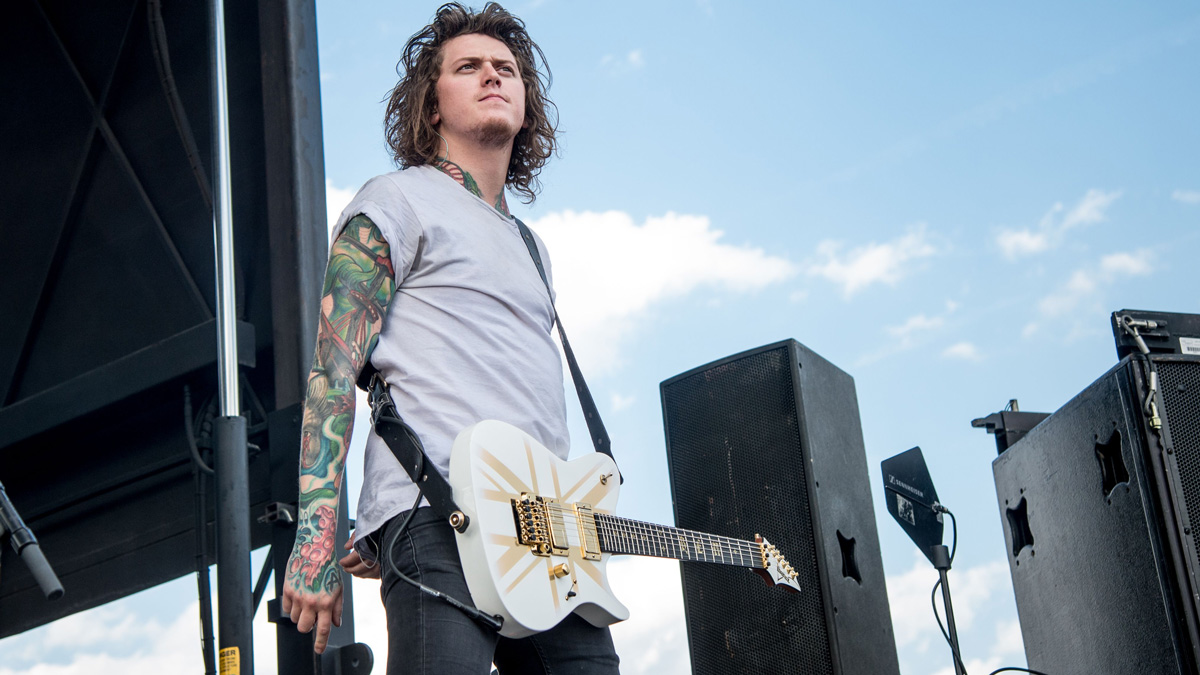Asking Alexandria's Ben Bruce: my top 5 tips for bands
Frontman talks setbacks, metal snobs and guitar skills

Introduction
With Asking Alexandria, guitarist Ben Bruce has flown the flag for Brit metal around the globe.
The Yorkshire band have scored three US top 10 albums in a row since 2011’s Reckless & Relentless, and they cracked the UK top 20 with The Black earlier this year.
While such success Stateside suggests a band that has been given a hefty dollop of major-label help, that is not the case. Instead, Bruce and his bandmates made the gutsy decision to try and break America before they had even secured a record deal or a manager.
In doing so, they committed themselves to years of hard graft, travelling in and out of the US on tourist visas and sleeping in supermarket car parks until they finally attracted the attention of Sumerian Records in 2009.
But it’s been all plain sailing since then, right? Not quite. Just as AA looked set to make the step up to worldwide arena fillers, the band was rocked by the departure of vocalist Danny Worsnop.
That would have finished many bands off, but Bruce and co dusted themselves down, recruited new singer Denis Stoff and put out The Black, a stunning statement of intent.
Looking back on the crazy eight years since forming the band, Ben says, “We haven’t had time to sit back and breathe and think about everything that has gone on; we’ve just got on with it.”
We haven’t had time to sit back and breathe and think about everything that has gone on; we’ve just got on with it
Right there is a major cornerstone of Asking Alexandria’s success: a never-say-die attitude and the will to just keep on going, even in the toughest circumstances.
And it has paid off. As well as their impressive album sales, the band are also making waves on the live circuit and return to the UK this summer to headline The Pit stage at the Reading and Leeds festivals.
With this in mind, when we spoke to Ben, we wanted to know just how young bands can follow in these footsteps. Here follows Ben Bruce’s top five tips for bands.
Don't Miss
Asking Alexandria's Ben Bruce: the 10 records that changed my life

1. Take setbacks on the chin
“As clichéd and as corny as this sounds, anything is possible. You get told when you lose a vocalist from a band you’re done for. That might be true for a lot of bands, but if you look back in history, it isn’t always the case.
“Look at bands like Iron Maiden, AC/DC, Killswitch Engage, even more recently. It is possible, but you just need to be confident in yourself. You need to take setbacks as a kick up the arse.
“You have to accept it has happened, and you can either roll over and die, or you can get together and carry on doing what you love doing and do it well. If you do it well and people can hear that you love what you’re doing, then why would they turn their back on you?”

2. Follow your dreams… and walk the high beam
“It might sound irresponsible to do what we did and move out to the US with no money and just try to make it, but I would recommend it.
“If you have your heart set on something, you should follow that dream until it happens. I never had a plan B. If you have a plan B and something to fall back on then you don’t have the fear and the drive to make sure that you succeed.
If you have your heart set on something, you should follow that dream until it happens
“If you know that you don’t have a safety net then you know if you fall off the high beam you’re done for, and you will do everything in your power to get across that high beam.
“You can tell the difference between young musicians who don’t have a plan B and for whom music is the be all and end all and those who have that safety net and have the attitude that they hope it works out for them, but if it doesn’t they’ll quit and do something else.”

3. Take a risk
“People have a misconception that we got plucked out of nowhere and had a big push in the States. It didn’t happen like that.
“We came to the States very young - I was the oldest at 19. We left our friends and family behind, we had nowhere to live, no money beyond a little bit of money for food our parents might give us every now and then.
“It took a few years of living in Wal-Mart car parks to get where we are. The bands that haven’t put the miles in and gone through some shit times, more often than not they don’t survive because they don’t appreciate what they have.
“We have been incredibly successful and we have toured the world, but it doesn’t go to our heads because we know how hard we have worked to get here. We don’t sit down thinking we’ve made it; we sit down and think that there’s more work to be done, and we have more to do so we can accomplish everything that we want to accomplish.
It took a few years of living in Wal-Mart car parks to get where we are
“There’s a lot of older, more established bands that I know or even that I have grown up listening to, and they say that they will only go to the US once a year or once every two years because it is so expensive, and they blame their lack of success over there on that.
“The fact of the matter is, is it that expensive? The flights over are, maybe, but if you only come over once a year, you will never get to the size where you’re earning good money in the US.
“You have to just take the plunge and think that for a little while you will need to just eat shitty food, put the work in and tour in a shitty van instead of a shiny bus.
“Put the time in and it will come for you, I really believe that. There is an attitude about putting that work in that needs to change. Again, you can really see the difference between the bands that are willing to put that work in and the ones that won’t.”

4. Work on your songwriting
“I listened to a lot of pop-punk and metal when I was growing up, and then I would listen to The Beatles and Oasis and blues.
“When I was young, it was important for me to be an incredible guitarist and I became a really good guitarist for my age. For my GCSE Music performance, I played Still Got The Blues by Gary Moore and I nailed it.
“But then somewhere along the line that became less important to me, and what became more important was being a good songwriter. I don’t think it is that important to sit in your bedroom for 12 hours a day learning scales and learning to shred unless that is something you have a genuine passion for.
You never heard any of The Beatles tapping and shredding, but that never detracted from their songwriting abilities
“A lot of kids get pressured when they start playing guitar feeling like they’re shit if they can’t play this guitar solo or that riff. I think that is just rubbish. You never heard any of The Beatles tapping and shredding, but that never detracted from their songwriting abilities.
“When I was at school, I felt a pressure to shred, but luckily I figured out that is not what’s important. I would rather write a great song that stands the test of time rather than shred.
“I also hate the attitude that you should only listen to metal music. You see the term 'metal elitist' around a lot. As a musician, you should be open-minded to all kinds of music. Music has its roots, and there is so much music to enjoy.
“You can listen to a classic like Don’t Stop Believin’ and then you can listen to Pokerface by Lady Gaga and realise that they have the same chord progression. It doesn’t matter what the genre is: music is music.”

5. Help each other out
“Collaborating with other musicians is important. That’s a funny thing about the metal community: metal bands seem to compete with each other and hold each other down.
“Then if you look at other genres of music like hip-hop or EDM, all of those artists collaborate with each other. They help each other and grow each other’s fanbases.
Metal bands seem to compete with each other and hold each other down
“If you try and organise a tour in the metal world - I’ve tried a million times to get some kind of super-tour going, because it would be great and the fans would freak out.
“But it never happens because there are always questions about who would open and who would close the shows. I say we should just flip-flop the line-up around every night, but there is just too much ego involved. If young artists keep on collaborating, then maybe metal bands will take note.”
Don't Miss
Asking Alexandria's Ben Bruce: the 10 records that changed my life
Rich is a teacher, one time Rhythm staff writer and experienced freelance journalist who has interviewed countless revered musicians, engineers, producers and stars for the our world-leading music making portfolio, including such titles as Rhythm, Total Guitar, Guitarist, Guitar World, and MusicRadar. His victims include such luminaries as Ice T, Mark Guilani and Jamie Oliver (the drumming one).
